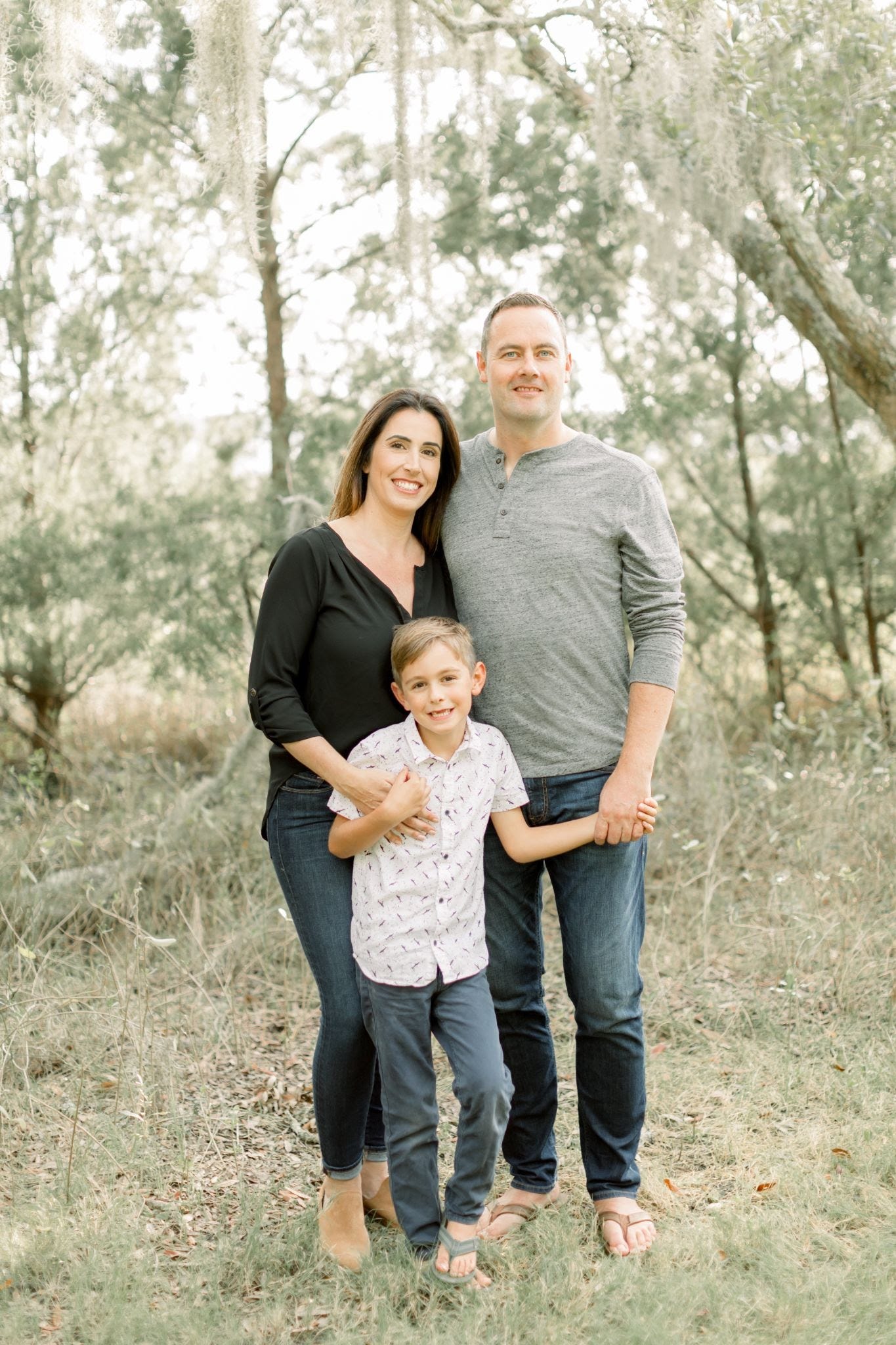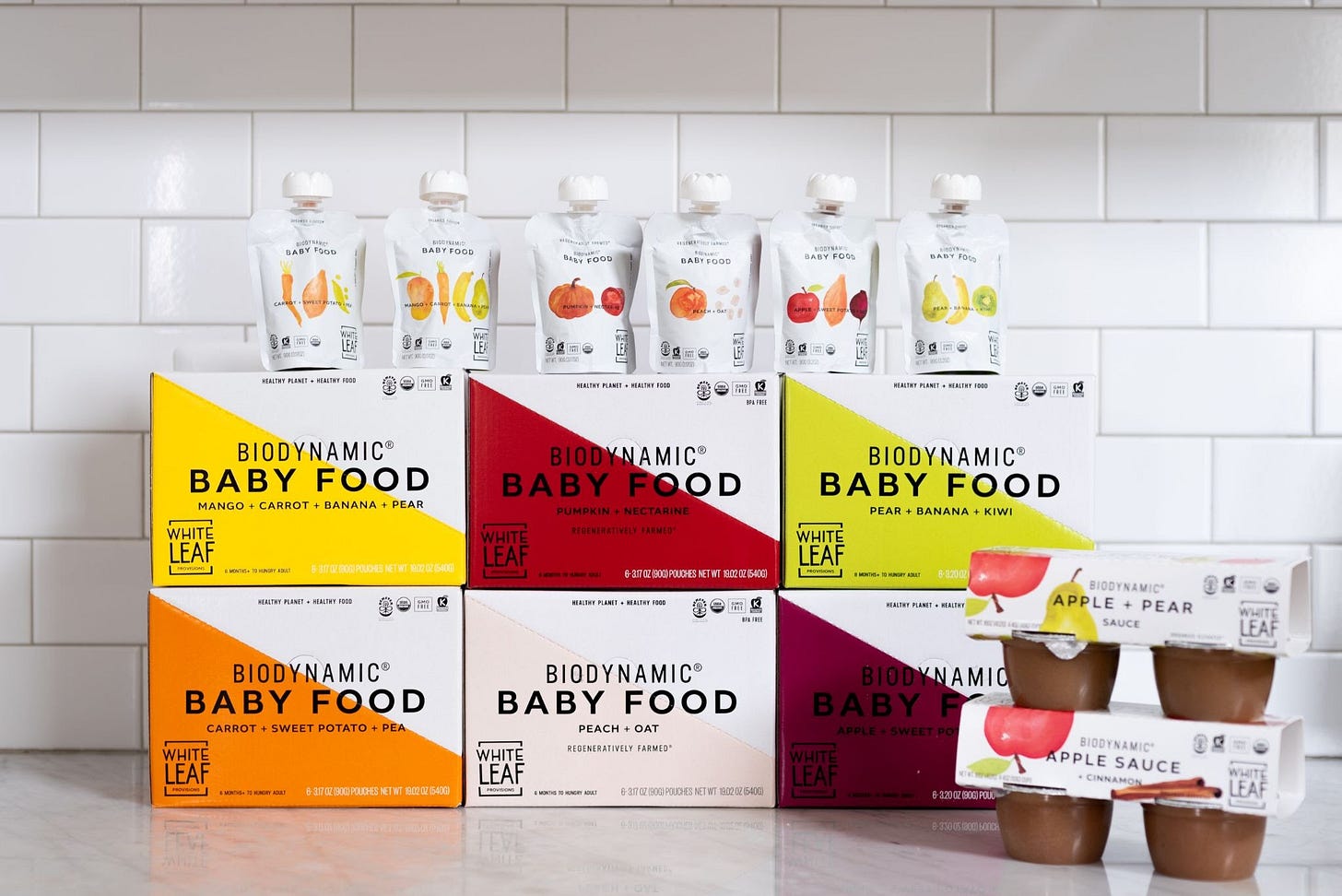🧑🍼What Should We Feed Our Babies? Spotlight on White Leaf Provisions
Editor's note: I'd like to introduce my colleague Josh Kiman as a contributing author to The Regeneration Weekly. Josh will write occasional deep dives on regenerative topics and help keep our content as fresh as possible. Enjoy!
As a parent of a toddler and baby, my wife and I have spent a lot of time thinking about what to feed our kids. I distinctly remember one trip to a Whole Foods to buy some yogurt for my baby girl. I probably spent 10 minutes searching through a sea of yogurt brands for a full fat yogurt that was not packed with sugar and artificial ingredients. But time is a precious commodity, so we’ve taken shortcuts. We used to buy organic fruit and vegetable pouches that our kids loved and we often caved to our son’s request for the pouches with Sesame Street characters. We suspected these pouches weren’t the healthiest options, but we focused on convenience, accessibility, and the organic label.
In analyzing our consumer purchasing decisions, I often think about our Amazon Prime culture. We want to make decisions as quickly as possible and we love companies that make our lives easier and save us time. Even if you want to purchase healthy and untainted food, how much time are you actually going to spend at the grocery store or online to figure out which products are better than others? Even if you have all the time in the world and are well-versed in regenerative agriculture and nutrition, can you really make sense of the morass of confusing and misleading food labels? Though we wanted to buy healthy products for our kids, we were often lazy and regularly purchased the popular organic baby pouches found in most stores and on Amazon.
Then in February 2021, we saw headlines about a Congressional report entitled “Baby Foods Are Tainted with Dangerous Levels of Arsenic, Lead, Cadmium, and Mercury.” We reviewed a couple articles explaining that several of the largest baby food companies (Nurture (HappyBABY), Beech-Nut, Hain (Earth’s Best Organic), and Gerber) were selling items containing dangerous levels of chemicals that posed serious health risks to babies and toddlers (largely related to neurological and brain functioning). We lost trust in the major baby food companies and lamented the countless HappyBABY and Earth’s Best pouches our son had consumed. My wife decided to prepare baby food from scratch because the pouches had been our kids’ primary source of vegetables.
I finally read the Congressional report this past weekend, and the results of the investigation are illuminating.
Dangerous Levels of Arsenic, Lead, Cadmium, and Mercury
The internal company documents provided by HappyBABY, Beech-Nut, Hain, and Gerber revealed chemical levels “multiples higher than allowed under existing regulations for other products [such as bottled water and drinking water]: including results up to 91 times the arsenic level, up to 177 times the lead level, up to 69 times the cadmium level, and up to 5 times the mercury level.”
Nurture, Beech-Nut, Hain, and Gerber Set Their Own Dangerously High Internal Standards for Toxicity and Routinely Ignored Them
Baby food manufacturers are free to set their own internal standards for toxic heavy metal levels. They often set those standards at dangerously high levels and then blithely disregarded them to sell products with even higher heavy metal levels.
Walmart, Sprout Organic Foods, and Campbell Refused to Cooperate with the Subcommittee’s Investigation
Whereas Nurture, Beech-Nut, Hain, and Gerber responded to the Subcommittee’s requests, Walmart (Parent’s Choice), Sprout Organic Foods, and Campbell (Plum Organics) refused to cooperate with the investigation. Independent testing of Walmart, Sprout Organic Foods, and Campbell products confirmed that their baby foods contain “concerning” levels of toxic heavy metals.
Policies Testing Only Ingredients, Not Final Products, Underrepresent Toxicity
On August 1, 2019, the FDA received a secret slide presentation from Hain revealing that inorganic arsenic levels were higher in finished baby food products than the company had estimated based on individual ingredient testing. The Subcommittee stressed that “only final product testing can measure the true danger posed by baby foods.” “To this day, baby foods containing toxic heavy metals bear no label or warning to parents. Manufacturers are free to test only ingredients, or, for the vast majority of baby foods, to conduct no testing at all. FDA has only finalized one metal standard for one narrow category of baby food, [but even] this standard is far too high.”
In response to the Subcommittee’s report, the FDA released its Closer to Zero Action Plan, which lays out a general approach to arrive at toxic element “action levels.” The FDA claims that its “testing shows that children are not at an immediate health risk from exposure to toxic elements at the level found in foods.” But anyone reading the Subcommittee’s report will have a very difficult time accepting the FDA’s assertion. In March 2021, lawmakers from both Houses of Congress introduced a bill setting initial heavy metal limits (with the ultimate goal of reducing the levels as close to zero as possible), mandating testing of only finished products, and calling for a public awareness campaign and significant research funding to reduce heavy metals in crops. It’s unclear if this bill will become law.
So what should parents do when purchasing baby food? Even if it might seem like searching for a needle in a haystack, there are trustworthy brands that genuinely set themselves apart. Enter White Leaf Provisions, a phenomenal regenerative focused family brand emphasizing quality, transparency, and accountability above all else. All ingredients used in White Leaf’s products are certified as Regeneratively Farmed®, Biodynamic®, GMO-Free, Organic, and glyphosate-free. Friends at Provenance Capital Group graciously connected me to Keith and Meghan Rowe, the husband and wife co-founders of White Leaf. Their story, ideals, integrity, and authenticity are captivating.
Keith grew up in a small rural Irish community where families practiced a “very clean and old way of farming” as farmers couldn’t afford expensive chemicals and equipment. Diets were simple and extremely nutritious, and Keith fondly recalls getting butter and jam from his neighbors. Keith became a classically trained chef and cooked all over the world. Always interested in clean ingredients and simple preparation, Keith was drawn to biodynamic farming, which aims to create completely self-sustaining farms that promote biodiversity, integrate crops and livestock, and foster thriving ecosystems untarnished by chemicals. Keith appreciated the 100-year history of biodynamic farming principles, first articulated by Rudolf Steiner in a series of lectures in 1924. He especially respected the Demeter certification, which was based on Steiner’s teachings and trademarked in 1928.
When studying photography in Paris and Spain, Meghan fell in love with Europe’s approach to food and farming. Keith moved to America 13 years ago and fell in love with Meghan. The catalyst for White Leaf was the birth of their first child (Keegan) eight years ago. While Keith prepared nearly all of Keegan’s food from scratch, like all parents, he wanted some pouches for the car, the park, or quick trips. Keith recalls trips to Whole Foods, where he saw myriad baby foods with organic and GMO-free certifications. It seemed to Keith that parents were demanding better and cleaner food. But when Keith dug deeper, he couldn’t find products with the transparency and quality of Demeter-certified European products.
Instead, everything in America seemed to lead back to marketing tactics (like images of a “cutesy teddy bear”). Keith understood that the average person’s perception of “organic” was far divorced from reality. Keith wanted a much clearer picture of the carbon footprint, soil microbiome, and chemicals associated with baby food products, and the only way to get that was by focusing on the soil, the farms, and the entire supply chain. So he and Meghan set out to create a family brand 100% committed to transparency, soil health, optimal quality, nutrient density, and farmers.
When Keith and Meghan started brainstorming 8 years ago, hardly anyone was talking about regenerative agriculture, let alone biodynamic farming. Already familiar with the stringent Demeter certification, Keith and Meghan reached out to Demeter USA to find farmers applying biodynamic principles. Demeter checks every part of the production process, from the seed to the farm and all the way to processing and packaging. The Demeter certification process is infinitely more onerous and time-consuming than that associated with the organic certification, with greater emphasis on disease, pest, and weed control, and more extensive specifications regarding water conservation and biodiversity. Keith and Meghan firmly believe that the more rigorous certification is necessary to verify that their products contain the purest and healthiest ingredients and to ensure that their farmers are protecting their soil and ecosystems. Indeed, White Leaf’s baby food pouches and applesauce are the first line of shelf-stable baby food to be certified as Glyphosate Residue Free in the United States. White Leaf scrutinizes every element of its business from a regenerative mindset, and that extends to packaging. It goes to great lengths to use the minimum amount of packaging and partners up with TerraCycle to pay for a free recycling option for its customers.
While it’s frustrating for Keith and Meghan to see many players jumping on the regenerative bandwagon in name only, they always come back to their North Star. As parents, Keith and Meghan want to provide their children food that is clean, nutrient-dense, and chemical-free. That is the pledge they have made to their customers, and that is why they always go the extra mile and never take any shortcuts. White Leaf customers can sleep easy knowing that they are buying products that have been rigorously tested and monitored every step of the way.
I’m so drawn to White Leaf because it does all the heavy lifting to make it easy for parents to buy products they can trust. Anyone who talks to Keith and Meghan immediately knows that they are the real deal and that they are doing things the hard way because it is the right way. We all know how incredibly rare that is on a personal and professional level.
Shop: Check out White Leaf’s fantastic products, which my kids love. Use this SOILWORKS link for a 20% discount.
Further Deep-Dive - Podcast and Book Recommendations:
Here are some great podcasts and books I’ve consumed over the past few months that touch upon issues discussed in this newsletter.
Monsanto’s World of Deception, Greed, and Glyphosate with Carey Gillam (Broken Brain Podcast)
The Big Fat Surprise: Why Butter, Meat, and Cheese Belong in a Healthy Diet (by Nina Teicholz)
Farmacology: Total Health from the Ground Up (by Daphne Miller, M.D.)
Nourishment: What Animals Can Teach Us About Rediscovering Our Nutritional Wisdom (by Fred Provenza)
Disclaimer: The Regeneration Weekly receives no compensation or kickbacks for brand features. We are simply showcasing great new regenerative products.
If you have any products you would like to see featured, please respond to this newsletter or send an email to Kevin(at)soilworksnaturalcapital.com.
The Regeneration is brought to you by Wholesome Meats | Soilworks | Grassroots Carbon| Grazing Lands





